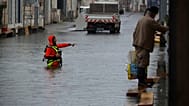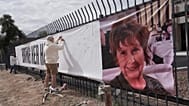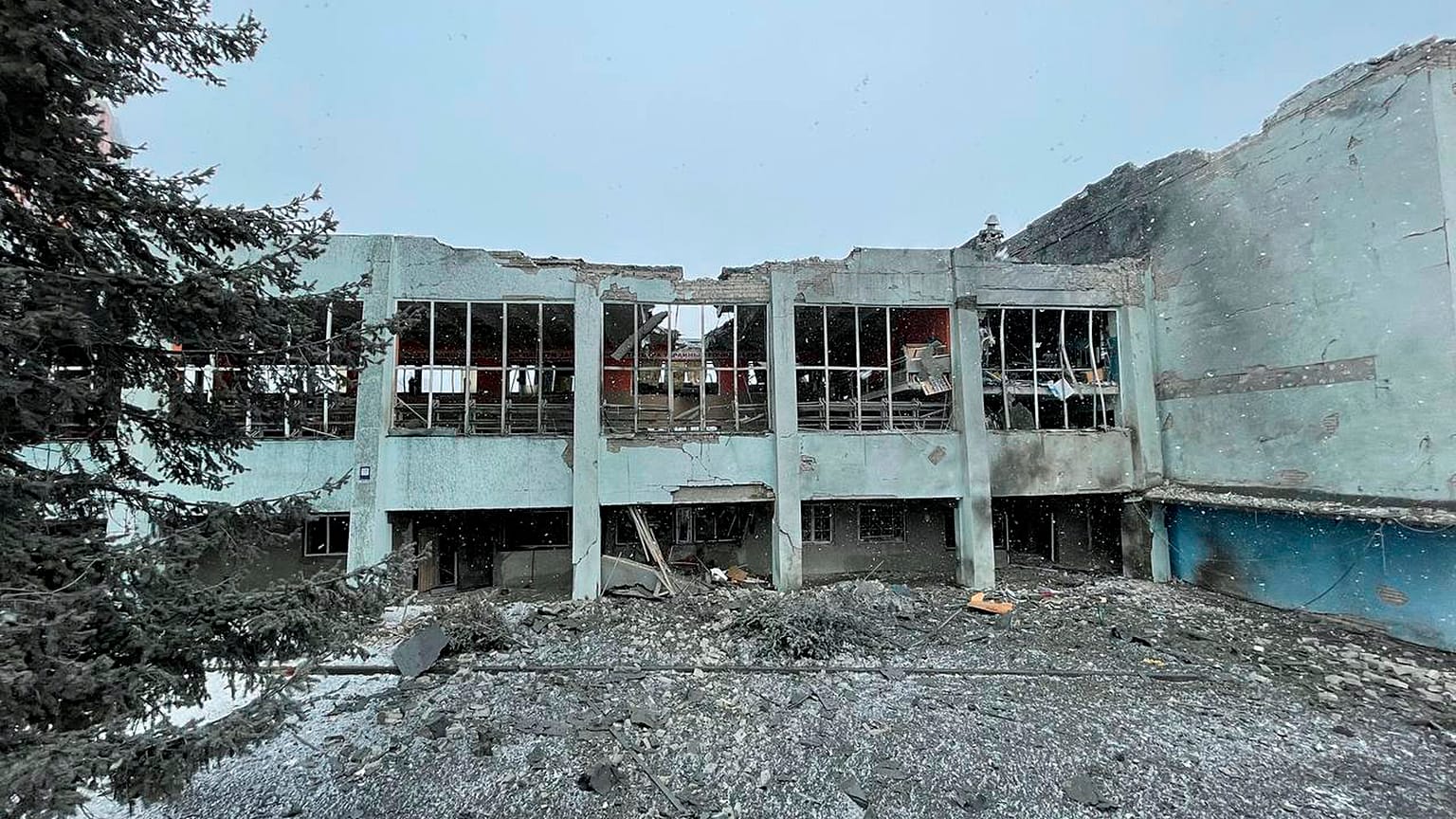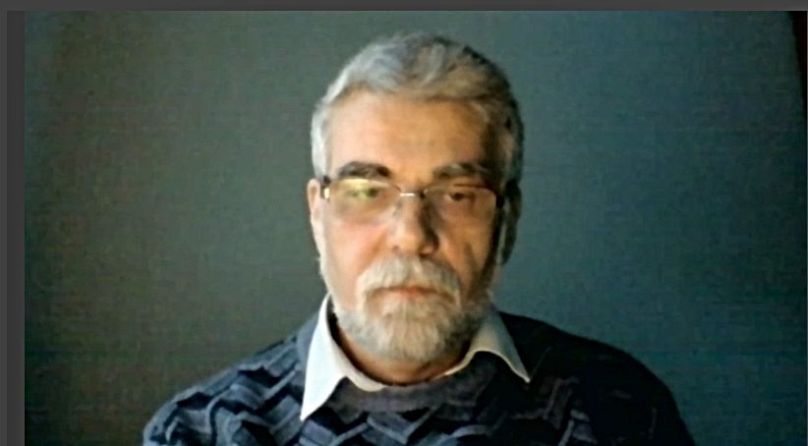"Those people who never wanted to this week began to switch to the Ukrainian language just to distinguish themselves from the occupants."
_Konstantin Zadorozhny, 50, teaches at the university in Kharkiv, a city that has been under heavy bombardment since the start of the war in Ukraine on 24 February. _
 ADVERTISEMENT
ADVERTISEMENT
 ADVERTISEMENT
ADVERTISEMENT
Here he tells Euronews about the damage inflicted on the city, the psychological trauma of living under attack and how some in this Russian-speaking area are switching to Ukrainian to differentiate them from those bombing Kharkiv.
"At 5 am on 24 February we woke to explosions. The first one or two days it was mostly rumbling because they were hitting military objects first. And then very big problems started, Russian troops tried to take the city by storm.
"In Ukraine, a lot of people went into territorial defence. These are actually armed residents. Many of them have some experience -- although by no means all of them -- having also served in the conflict in Donbas (eastern Ukraine) that has been going on for eight years. But still, most of them are ordinary people with no combat experience.
"I do not go far, because my health condition is not very good after my heart attack.
"What's happening in the neighbourhood? I showed pictures of the Palace of Labour. It's not far from me, near the city hall. Either a missile or a very powerful bomb hit it. Constant explosions from all sides.
"Our mayor's office posts pictures, our regional administration posts pictures too. In this respect it's good - the awareness is high. Well, friends, relatives also from all over Kharkiv tell us, send photos.
"Yesterday they said that they were shelled very strongly and my friends who live there confirm it. We have a residential area Saltovka - a very large residential area. There are high-rise buildings of nine, 12, 16 floors, Soviet construction, about 40 houses have burned down. These are fires in houses that were hit by missiles.
"We know where our troops and the Russian troops are located. The shelling is coming from the Russian side, it is very clearly visible. Locals can see who is shooting. And the general opinion of the townspeople is that there is no Ukrainian shelling, only the Russians are shooting. This is the opinion of the residents of the city.
"I was standing in line at the store again today, going out. People say the same thing among themselves: Russia is shelling, Russia is bombing. There are practically no Ukrainian planes over Kharkiv now. The aviation that remains is in the western part of the country. I can hear the planes very well. The plane flies low, a strong sound - a dropped bomb, the bomb explodes.
"Mostly we sit at home. We have an old house. It's more than a hundred years old, the walls are thick. Unfortunately, the basement in it is not adapted to be a shelter. You can't go down into it. In the house, because of the thick walls, you can more or less safely wait out shelling and bombing.
"There are a lot of Kharkiv residents in the subway right now. This is probably the safest place in Kharkiv. A lot of people are sitting in basements.
"My cousin and her son and grandchildren are sitting in the basement. Their basement is a little bit better. They sit in the basement all day and only come out when there is no alarm and go up to have a little rest.
"At night, from time to time, there is shelling. It is hard to sleep. It is hard from the silence. The silence presses. In between these [blasts] tension: you wait, where will it hit? Will it hit your home? All this is psychologically very difficult.
"Some people try to leave. You can get out. People go by train, some leave by cars. But it's still dangerous. It's hard to get to the station, especially from the districts that are being shelled. But they are leaving. Cabs work, they take people out sometimes, too.
"There are stores near me, they work. Not all supermarkets. People come and stand in line. It should be noted, though, that people are holding up very well. They don't panic. There is no crush in the line.
"It's a little worse with pharmacies, but they also exist and work. It's bad in the areas that are closer to the outskirts, there are more supermarkets ruined. For example, we have the Horizon housing estate in the east of the city. I used to live there, and I have many acquaintances there as well, they wrote that both supermarkets that stood there burned down and there were problems.
"There is no hunger yet, but some shortages are beginning to be felt. Humanitarian aid is being delivered to the city. There is a network of points where you can get it. I did not go there because we still have food. Many people need it more, so I don't go there.
"Kharkiv was once founded by Ukrainian Cossacks, and it was Ukrainian-speaking for a long time. It became Russian-speaking later under Soviet power. At that time it was almost entirely Russian-speaking, there were few Ukrainians.
"Under independent Ukraine, the number of Ukrainian speakers was increasing, especially after 2014, but there was still a majority of Russian speakers. After this invasion, after the bombing, after the shelling, despite all the sympathies that exist and the family ties with Russia, the vast majority of the population now has a dramatic change of heart to an anti-Russian attitude. Because when you are being bombed in any other way it is hard to perceive.
"Those people who never wanted to switch (to the Ukrainian language), during this week began to switch to the Ukrainian language just to distinguish themselves from the occupants.
"The range of opinions was wide. Kharkiv has traditionally favoured close ties with Russia. Many of our politicians in Kharkiv based their policy on this idea of brotherhood with Russia, and they built it quite successfully. The population supported it. And now probably part of the population holds the same views. Sometimes it's simply impossible to change their minds. But I am talking about a general trend. The majority of the population has changed dramatically, even if they were sympathetic (to Russia). We have a Russian-speaking mayor, he speaks in Russian now and talks about how we are defending the city from occupation. We have his competitor in the last election, who was all pro-Russian and now openly spoke out against this aggression.
"People in such a situation understand that it's just a question of survival. And they are just afraid of what will happen if such people come to us. There was no real reason to attack Ukraine. It's just scary."















